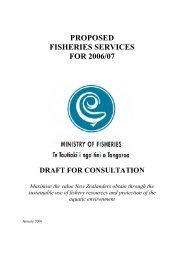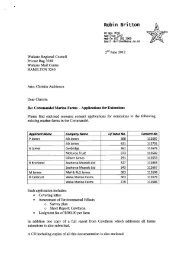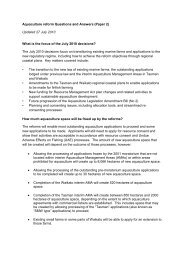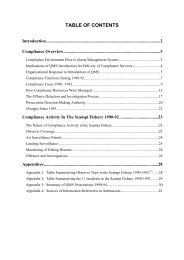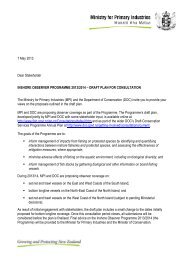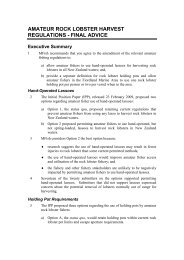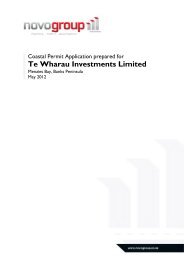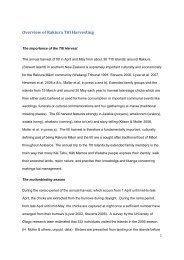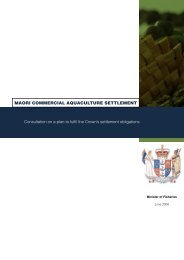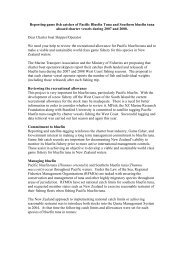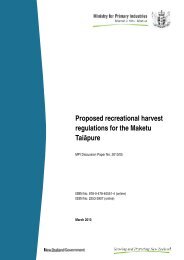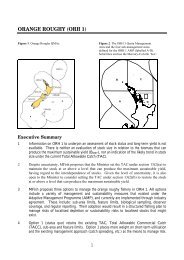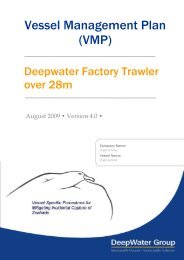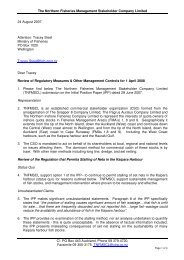Aquatic Environment and Biodiversity Annual Review 2012
Aquatic Environment and Biodiversity Annual Review 2012
Aquatic Environment and Biodiversity Annual Review 2012
Create successful ePaper yourself
Turn your PDF publications into a flip-book with our unique Google optimized e-Paper software.
AEBAR <strong>2012</strong>: Marine <strong>Biodiversity</strong><br />
to fisheries management <strong>and</strong> contribute to broader ecosystem-based management approaches in<br />
conjunction with the Coasts & Oceans Centre.<br />
11.3.1. The MPI <strong>Biodiversity</strong> Research Programme<br />
The recognition of increasing societal expectation to use fisheries management measures that will<br />
achieve biodiversity conservation has signalled by MPI through Fisheries 2030 52 in its long-term<br />
commitment to– “ecosystem based fisheries management” <strong>and</strong> to ensuring that “biodiversity <strong>and</strong> the<br />
function of ecological systems, including trophic linkages, are conserved”. While New Zeal<strong>and</strong>’s<br />
environmental record with regard to fishing is perceived to be relatively high on an international<br />
scale, the Ministry is not complacent about the ongoing requirement to monitor <strong>and</strong> provide evidence<br />
that measures to achieve biodiversity conservation needs are being met. This is particularly true of the<br />
need to better underst<strong>and</strong> <strong>and</strong> mitigate the effects of fishing on the areas impacted by fishing.The<br />
effects of fishing on the aquatic environment <strong>and</strong> risks to biodiversity <strong>and</strong> marine ecosystems are<br />
recognised in Fisheries Plans. Research continues to be supported through the Deepwater Research<br />
Plan, as well as the <strong>Aquatic</strong> <strong>Environment</strong> <strong>and</strong> <strong>Biodiversity</strong> Research Programmes.<br />
There are also a range of societal values beyond commercial, customary <strong>and</strong> recreational take from<br />
the sea that are recognised as part of “strengthening our society” (see footnote 12). These include<br />
aesthetic <strong>and</strong> cultural values as well as other economic values such as tourism <strong>and</strong> marine recreation<br />
other than fishing 53 . To link socio-economic values of biodiversity to science supporting fisheries<br />
management will require a multi-disciplinary approach only just beginning in New Zeal<strong>and</strong>.<br />
MPI responded to the NZBS in 2000 with the establishment of the MPI <strong>Biodiversity</strong> Programme<br />
which has run successfully for more than 10 years with 55 research projects <strong>and</strong> a large number of<br />
published outputs, presentations <strong>and</strong> contributions to NZ <strong>and</strong> CCAMLR management measures.<br />
The Ministry is one of several New Zeal<strong>and</strong> government agencies with a strong interest <strong>and</strong> a<br />
statutory management m<strong>and</strong>ate in the Ross Sea region of Antarctica through the Antarctic Marine<br />
Living Resources Act 1981. MPI Antarctic science contributes strongly to New Zeal<strong>and</strong>’s whole-ofgovernment<br />
involvement in contributions to the Commission for the Convention on Antarctic Marine<br />
Living Resources (CCAMLR) <strong>and</strong> the Antarctic Treaty. Research conducted under the MPI Antarctic<br />
<strong>Biodiversity</strong> Programme seeks to help New Zeal<strong>and</strong> deliver on its international obligations to support<br />
an ecosystem-based approach to management in Antarctic waters. There are strong links with the MPI<br />
Antarctic Working Group research <strong>and</strong> with other Ross Sea ecosystems research carried out under<br />
NIWA core purpose Fisheries, <strong>and</strong> Coast <strong>and</strong> Oceans Centres (e.g., Sharp et al. 2010).<br />
The biodiversity research programme set up under the NZBS was established with a multi-stakeholder<br />
biodiversity research advisory group (BRAG), chaired by the former Ministry of Fisheries (now MPI).<br />
The research commissioned for the period 2001–2005 reflected goals set by the NZBS <strong>and</strong> the<br />
BRAG, while remaining compatible with the Ministry of Fisheries Statements of Intent (SOIs).<br />
During the first three years of this period, MPI also commissioned marine biosecurity research under<br />
NZBS, but this was transferred to Biosecurity New Zeal<strong>and</strong> (MAFBNZ) in 2004. From 2006 to 2010,<br />
the programme evolved further with the development of a new 5-year work programme to address<br />
shortcomings identified in the review of the NZBS by Clark <strong>and</strong> Green (2006). An overview of the<br />
<strong>Biodiversity</strong> Programme at a glance is given in Figure 11.4.<br />
52 Fisheries 2030 The full document can be downloaded from www.fish.govt.nz/en-nz/Fisheries+2030<br />
53 MARBEF: The Valencia Declaration 2008 www.marbef.org/worldconference<br />
246



